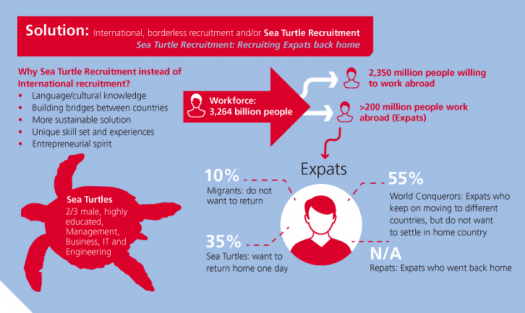Sea Turtles — expats who want to return one day to their home country — are a very interesting talent acquisition source abroad. Often this source is overlooked and underestimated when recruiting internationally. Intelligence Group wrote a whitepaper on this subject: why are Expats a relevant talent acquisition source? How can you recruit their unique knowledge and know-how back home?
Sea Turtles as a Solution for Talent Shortages
Worldwide there are more than 200 million Expats. Among them 70 million want to return one day. These Sea Turtles gained international work experience, know several languages and cultures, gained unique knowledge and expertise, and learned how to be successful out of their comfort zone. In short, they are a unique, very relevant and interesting talent acquisition source. This talent is one of the often overlooked answers to talent shortages concerning very specifically trained employees. And this is missed opportunity: One third of the worldwide employers still experience difficulties fulfilling vacancies. Sea Turtles could be an interesting answer to (local) talent shortages before employers turn to “real” international recruitment. Sea Turtles have unique skills and know-how that can support local companies in their home country by:
- Building bridges between cultures
- Closing international partnerships
- Extending new divisions
- Sharing and teaching expertise and knowledge
- Creating or revitalizing start-ups that boost up economies
Many Sea Turtles are very aware of their choice to stay abroad or to return. Returning often relates to family ties: family members they left behind and their own family, children who are not familiar with their roots, and/or who need to attend school. Other drivers for return to their home country are career possibilities and the opportunity to support and strengthen the local economy of their home country by sharing their expertise or starting a new company. Their decision to return and their reasons for doing so are related to the drivers that made them leave their home country up front.
Finding Sea Turtles
Due to their stay abroad for several years, Sea Turtles often have a limited professional network in their home country. In their search for a new challenge back home, their former network often does not work properly anymore. Abroad, the expat network is extensive and solid. This is often a offline network where Expats can share their experiences living abroad, out of their comfort zone. B
esides the often applied online communities that can differ enormously per nation or even region, a successful Sea Turtle Recruitment plan should embed offline networks and communities. Examples of best practices of reaching Sea Turtles include connecting with former networks in the home country of alumni, a talent scout abroad who mingles in the offline expat networks, and contacting personal coaches or recruiters who council Sea Turtles in their search for an appropriate job and employer back home.


Reverse Culture Shocks When Recruiting Sea Turtles
Sea Turtles fear culture shocks when coming home … in their private as well as professional life. They are used to extensive responsibilities and freedom, significant status as a specialist or general manager, and to their “expat life’”that enables them to live at a standard that would not be theirs back home. Sea Turtles realize they need to re-adjust to their former life. Nevertheless, the majority of the returning Sea Turtles experience “reverse culture shocks.” The impact of coming home is often underestimated. These shocks are often encouraged by a sense of limited freedom, lost independence and status, as well as scarce empathy of non-repats. When an employer does not support the returning Sea Turtle, it risks this new, unique talented employee getting depressed and deciding to leave the country again, this time for ever.
Employers who consider recruiting Sea Turles should prepare a dedicated onboarding and re-integration program. This includes integration of the whole family, not just the hired employee. Moreover, a successful hiring attempt starts with meeting the Sea Turtles’ desires that involve the impact they want to have in their job, their ambitions, and the work environment and conditions in which they grow and flourish.
Below is an executive summary of a whitepaper on this topic. The research on expats and Sea Turtles is primarily based on the Global Talent Mobility Survey which has been conducted by Intelligence Group in cooperation with The Network in 2011. Over 162,000 participants from 66 countries worldwide answered questions about their careers, expertise, ambitions, and media behavior. In total 10,488 respondents fit the definition of “expat.” In addition Dutch expats/repats have been interviewed. The Novo Group also conducted research.


